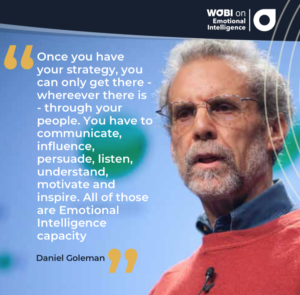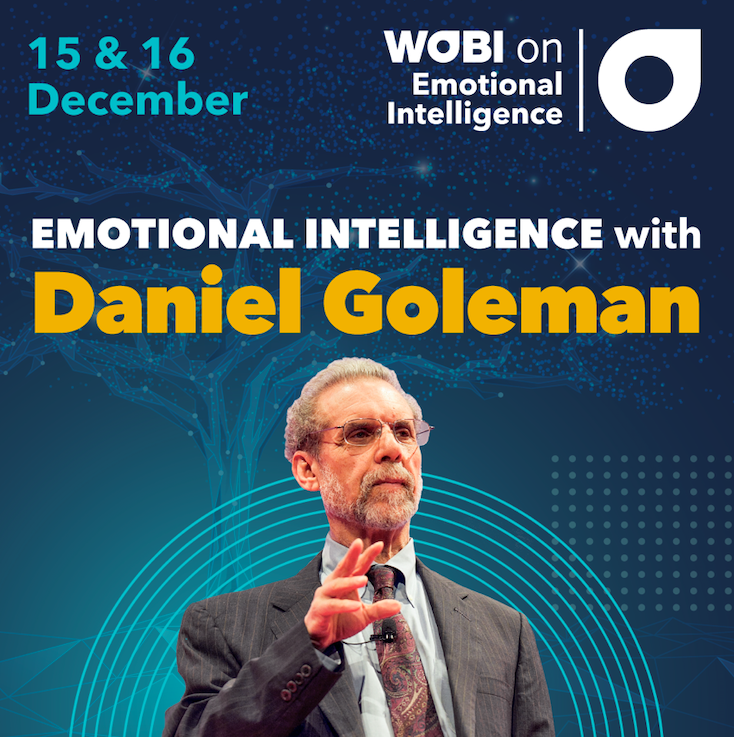People give their best effort for a leader they like.
An essential focus in a crisis is to recognize the impact the uncertainty is having on the people that drive the organization. And at such times, emotional intelligence is critical.
With the pandemic-driven migration to remote work accelerating health care companies’ movement toward the future of work, doors are open for innovation. But to achieve and seize the opportunities ahead, we need to use a different style of learning than that we used throughout our academic years, says psychologist and author Daniel Goleman, best-known for his research and writing on emotional intelligence.
“No matter what your vision might be, you can only accomplish your goals through people. And people give their best effort for a leader they like – one with emotional intelligence. Because employees with this skill set, data shows, are top performers.”
Emotional regulation refers to regulating and controlling the behaviour that our emotions trigger. Even in the most stressful of situations, people with strong emotional self-control manage to stay composed and poised. For business leaders, this is a critical competency to develop, since a leader’s conduct is mirrored in the conduct of his/her team. However if the leader loses his/her temper often, this can create an atmosphere of anxiety which may ultimately impede the team’s productivity.
Have you managed your own stress and anxiety during this crisis? Can you show resilience by being calm and clear?


These troubled times, with such great uncertainty and so much work done at a distance, certainly calls for us to handle our own emotions and to show empathy, says Goleman, offering some tips on how to apply to your own business situation:
- Employees who are the most frazzled can be helped greatly when their boss shows them empathic concern. This might take a one-on-one conversation, ideally about the other person – how they are doing, what they hope for these days, and, perhaps, how you can help them.
- Emotionally intelligent leaders inspire others to give their best. They can surface and help settle conflicts effectively. Tellingly, they see themselves as coaches and mentors for those who report to them – a performance review, for example, does not mean a harsh judgment, but rather an opportunity to give realistic feedback while offering ways for the person to improve.
- Any habit, even lifelong ones, can change. Poor listening is the common cold of management – it’s seen in every relationship where there is an imbalance of power, with the more powerful person paying less attention than does the person with less power. But the poor listener has to first see the drawbacks of this poor habit, then practice paying attention – being fully present to the person in front of him or her. New habits solidify when this practice is repeated and consistent.
- Remember leadership in crisis starts with managing your own emotions. When psychologist Sigal Barsade, now at Wharton, was at the Yale School of Management she did a series of studies showing that when a team leader was in a positive, upbeat mood, members of the team caught that mood and performance went up. When the leader was downbeat, that mood spread on the team, too, and performance went down.
- Emotionally intelligent leaders see themselves as team players, collaborating toward a common goal. The urge to get ahead for oneself, so powerful when people are individual contributors, gives way as you get a leadership position to shared, organizational goals.
- For small businesses owners still managing survival. Two things: first, lead yourself. Find ways to manage your own anxieties and upsets. Second, empathize with your customers or clients – what do they need now, and what can you provide them?
Final thought
If a CEO or other high-level executive models self-management and empathy, this sets a tone that can shift the norms and culture of the organization. That outfit then becomes a model for others – and this could amplify to a societal and even global level. Begin with yourself.
Lead from an inner posture, be sensitive to the emotional needs of your team – use empathy. Resilient leaders encourage their people to adopt a calm and methodical approach to whatever happens next.
Daniel Goleman on WOBI
- Learn the four parts of emotional intelligence – and how they are key to leading yourself and others
- Understand the 12 crucial Emotional Intelligence competencies and their role in high-performance leadership
- Building an emotionally intelligent organization
- Add Emotional Intelligence to your organization through recruitment, onboarding and leadership development
Sign up here.
Use our CEO NORTHAm code for a discount: CMWOEO10














